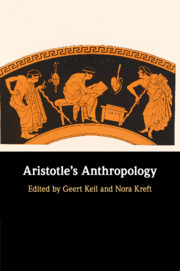Book contents
- Aristotle’s Anthropology
- Aristotle’s Anthropology
- Copyright page
- Contents
- Contributors
- Acknowledgements
- Introduction
- Part I Human Beings as Rational Animals
- Part II Human Nature in the Light of Aristotle’s Biology
- Part III Aristotle’s Moral Anthropology
- Part IV Aristotle’s Political Anthropology
- Bibliography
- Index
Part IV - Aristotle’s Political Anthropology
Published online by Cambridge University Press: 27 May 2019
- Aristotle’s Anthropology
- Aristotle’s Anthropology
- Copyright page
- Contents
- Contributors
- Acknowledgements
- Introduction
- Part I Human Beings as Rational Animals
- Part II Human Nature in the Light of Aristotle’s Biology
- Part III Aristotle’s Moral Anthropology
- Part IV Aristotle’s Political Anthropology
- Bibliography
- Index
Summary
The claim that human beings are by nature political animals is one of the most fundamental of Aristotle’s Politics, and, understandably, it has received a lot of attention.1 One very interesting, and fruitful, trend has appealed to the biological works to illuminate this famous thesis.2 This strategy has brought to light a broad conception of politicality which is exhibited by humans and other gregarious animals, including bees, wasps, ants, and cranes.3 As scholars have rightly emphasised, political animals in the broad sense collectively pursue a common end via a differentiation of roles or tasks. Different broadly political species have different common ends. Bees promote the good of the hive, wasps that of the nest, and so on. Nonetheless, every broadly political species has a shared end – really, a shared way of life – that all of its members promote in different ways. This is true of humans, although their way of life specifically involves forming and sustaining poleis, which makes them political in another, narrower, sense as well.4
- Type
- Chapter
- Information
- Aristotle's Anthropology , pp. 219 - 274Publisher: Cambridge University PressPrint publication year: 2019



